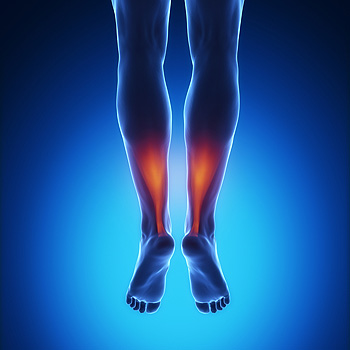 It is normal for the Achilles ligament to get injured. The tendon stretches from the heel to the calf muscles, and it is the largest tendon in the body. It is springy and is felt at the back of the ankle. It mainly helps raise your toes and point the toes towards the floor. It is common to feel stiffness or burning pain at the back of your leg, which is an indication that the Achilles tendon is partly or entirely torn. Achilles tendon pain affects your ability to walk.
It is normal for the Achilles ligament to get injured. The tendon stretches from the heel to the calf muscles, and it is the largest tendon in the body. It is springy and is felt at the back of the ankle. It mainly helps raise your toes and point the toes towards the floor. It is common to feel stiffness or burning pain at the back of your leg, which is an indication that the Achilles tendon is partly or entirely torn. Achilles tendon pain affects your ability to walk.
Causes of Achilles tendon
Every time you walk, you use the Achilles tendon to move the foot, although, it is prone to injury due to poor circulation.
- An injury can happen due to increased stress on the tendon through intense sports, especially those involving jumping, falling, or stepping into a hole.
- Achilles tendinitis injury can affect some parts of the tendon. There are two main types under this category the non-insertional Achilles tendinitis, which is an injury to the middle of the tendon when it breaks or swells, and the insertional Achilles tendinitis that affects the lower part of the heel and can cause bone spurs.
- Achilles tendon rupture is common among weekend warriors, who are mainly middle-aged people participating in sports part-time.
- Illness or medications such as certain antibiotics or steroids weaken the tendon leaving it prone to injuries.
Achilles tendon issues can be very uncomfortable to live with. If you are experiencing pain with your achilles tendon, contact the podiatrist at DeNiel Foot & Ankle Center. Our doctor can provide the care you need to keep you pain-free and on your feet.
Some factors that increase the risk of Achilles tendon rupture include:
- Age between 30 to 40 is more likely to experience Achilles injury.
- Tendon injury is more likely to occur in men than women.
- Recreational sports that have sudden stop and start, involving jumping or running, such as tennis, soccer, and basketball.
- Antibiotics such as ciprofloxacin and levofloxacin increase the risk of tendon injury.
- Being overweight puts more strain on the tendon.
- Steroid injections into the ankle joint can weaken the nearby tendons and can be associated with a tendon injury.
Prevention of Achilles tendon injury
The chances of developing Achilles tendon injury can be reduced by:
Stretching the calf until there is a noticeable pull. The stretching exercise keeps the tendon strong and increases its ability to absorb force thus preventing injury.
Alternate high impact sports with low-impact sports. Alternate running with swimming, and when injured avoid activities that place excess stress on the Achilles tendons.
Avoid running or training on slippery and hard surfaces.
Dress in well-fitting athletics shoes with properly cushioned heels and in cold weather dress warmly.
Increase training intensity slowly, that is the increase in distance, duration, or frequency, should be done at a rate of 10 percent.
The obvious symptom of Achilles tendon injury is pain above your heel when you are on your feet. The injury pain is usually instant but the area might be stiff, tender, and swollen. Immediately you notice symptoms of tendon injury, start by resting and applying ice, compression, and keeping the leg elevated until you can visit an Achilles tendon specialist for further treatment.


Comments
[…] from an Achilles tendon injury or surgery requires a structured rehabilitation […]
[…] Most people are familiar with the standard steps of the RICER method, but understanding each component on a deeper level can provide a fresh perspective on its effectiveness. The RICER method isn’t just about pain control; it’s about creating the right conditions for optimal tissue recovery. Each step plays a crucial role in promoting a stable recovery environment while minimizing potential damage, which is especially beneficial in the first 48 hours after an injury. […]
[…] Quick starts and stops can overwork this tendon, especially if you skip a proper warm-up. Achilles tendonitis often starts as mild discomfort but can escalate to severe pain, limiting your ability to play. […]